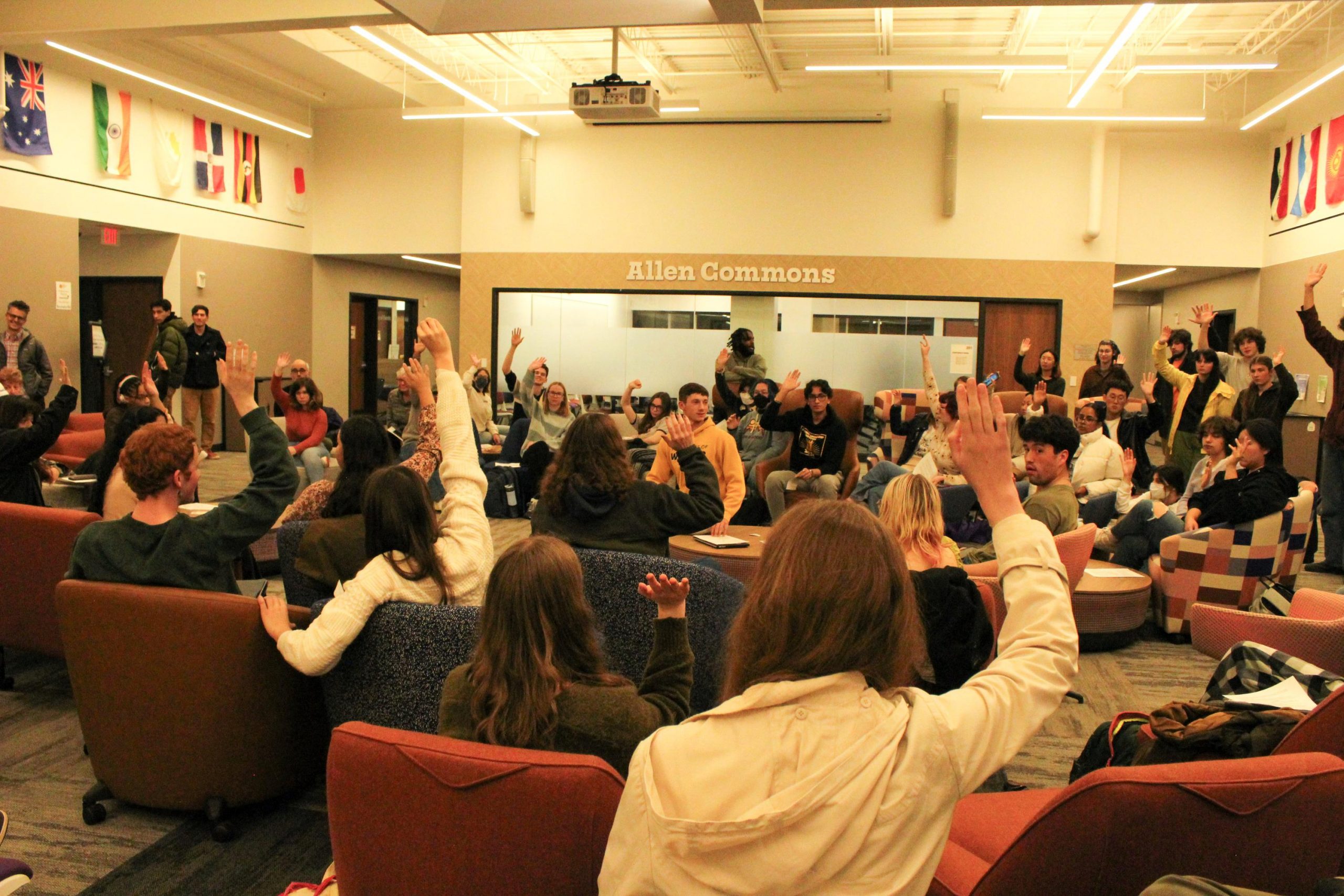
Students voted unanimously at the conduct committee meeting to have Scot Council vote on recommending disapproval of the current protest guidelines. Photo by Julia Garrison ’25.
Julia Garrison
News Editor
In a conduct committee meeting open to students on Thursday, Nov. 14, student attendees unanimously voted to recommend that Scot Council advise the Dean of Students to reject the “Student Speech and Demonstration Guidelines” in its current form. Scot Council voted on the issue in executive session during their weekly general assembly on Monday, Nov. 18 — with 24 voting members approving the recommended rejection, leaving only one member abstaining and no members rejecting.
Following recent concerns brought forward by both faculty and students about the implications of the protest guidelines, Scot Council’s conduct committee held an open forum during their weekly meeting to hear from students. Over 60 people attended the meeting on the second floor of Lowry Student Center including students, faculty, staff and community members from the greater Wooster area.
The meeting began with Scot Council president Andre Yazhbin ’25 and vice president Ryan Gross ’25 explaining the agenda and purpose of the public meeting. Gross and Yazhbin explained the process of how a recommendation is received and that Scot Council can only recommend rejection, not implement it. Yazhbin also expressed that Scot Council’s handling of the document was “unprecedented” — Scot Council has never hosted a forum of this nature before or made recommendations to the Dean’s office in this capacity before.
Yazhbin then opened the meeting to open discussion for students to critique and discuss possible solutions to the document.
“I don’t know how this can be edited to be better — at all,” Morgan Graham ’25 said. Graham proposed that Scot Council should align with the faculty, namely those who were present at the most recent faculty meeting and had expressed concern about the implementation of the document.
Caroline Ward ’25 said that, if implemented, this would further allow for the College to restrict protest and free speech. “I don’t think this [document] is the end [of restrictions] … are we accepting that the College has this authority?”
Noor Mushtaq ’28 called the contents “scare tactics,” while Gabrielle Risley ’27 argued that if the College is concerned about safety, there should be more education available on free speech and protest rights on campus.
Chelsea Polly, director of Title IX, was also present at the meeting and spoke on the safety concerns Risley had mentioned. Polly explained that reports were filed in relation to the Nov. 1 divestment protest for accessibility reasons relating to blocked walkways.
Laura Burch, associate professor of French and francophone studies, argued that walkways were cleared for students to utilize — but Polly explained that reports were made regardless of the validity of the situation.
“[The administration’s] big concern is safety. We have also got reports from other students who are choosing to not exercise their right or choosing to not participate in the protest which, again, is also their choice, but then they feel like they’re getting harassed by some people who are in the protest,” said Polly. She advised students to look at other colleges in the area and research their protest policies.
“[The guidelines] say that [the protest] must be accepted by all parties, but there has never been a protest in history where everybody accepted,” said TyLynn Gault ’27, asking Gross and Yazhbin if there was a way for the students to voice that the document does not make sense.
Assistant professor of history Beatrice Adams suggested that students visit the ACLU Ohio website to view recommended policy and guidelines for protest, free speech and their rights as students.
Aidan Loop ’25 argued that even if the document’s wording was changed to sound less enforcing, the Scot’s Key will bind students to follow the guidelines like policy.
“This is a document that … by associating with The College of Wooster, we are required to comply with.” Loop said. “It’s still opening the door for administration to take action against faculty and students if they don’t like what they’re doing.”
Mareike Herrmann, professor and department chair of German and Russian studies read a statement from Ian Kelly ’26, who could not be present at the meeting. In his statement, Kelly stated that “mere disagreement is not grounds for restriction.”
As the discussion reached the one-hour mark, Yazhbin took a vote from students and received a unanimous decision to recommend the rejection of the current guidelines.
Yazhbin and Gross brought this recommendation to be voted upon during Scot Council’s general assembly on Nov. 18 in executive session. During the closing discussion of the general assembly, four students expressed their thoughts about the importance of rejecting the guidelines and urged Scot Council to do so.
Scot Council’s voting members voted almost unanimously to recommend the rejection of the current protest guidelines, with only one abstention.
